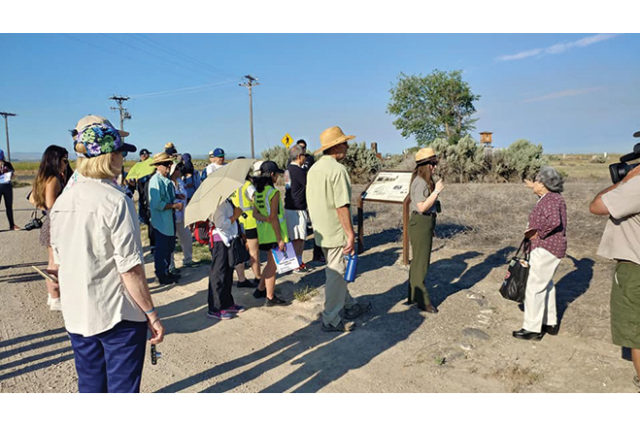by Stephanie Ikeda,
The North American Post
July 5th, 2018 marked the start of the annual Minidoka Pilgrimage. Activities occurred from morning to night and ranged from educational sessions and historical site tours to a social hour with obon dances and karaoke.

The Pilgrimage is a multigenerational, educational and commemorative event sharing the legacy of the Minidoka “camp” today known as the Minidoka National Historic Site. At this remote location in south central Idaho, over 9.000 Japanese Americans from areas in Oregon, Washington and Alaska were incarcerated without due process from 1942 to 1945. The Pilgrimage is a rare opportunity for people of all backgrounds, ages and knowledge of incarceration to come and learn about the history, often directly from survivors of the camps themselves. The Pilgrimage is fortunate to host dozens of incarceration survivors this year and others, many of whom still have vivid memories of their experience to share.
As a Pilgrimage Planning Committee member, I typically take the bus chartered by the Pilgrimage but opted to drive in a carpool this year. Our group made additional stops in Ontario, Oregon to learn about the lesser-known story of Japanese American farm laborers of the region. In the wake of Executive Order 9066, the farm labor shortage of World War II was partially alleviated as hundreds of Japanese Americans from the Northwest “volunteered” to live in labor camps managed by the Farm Security Authority. Entire families including young children in this program worked on sugar beet farms during and after World War II. During our visit to the Four Rivers Cultural Center in Ontario, we heard from Japanese Americans who have ties to farming communities in familiar areas such as the White River Valley and Portland, Oregon.
The Pilgrimage itself was a time to meet new people, reunite with old friends, and be inspired by a variety of talented presenters. Tani Ikeda, Emmy-awarded filmmaker and social justice leader, gave the keynote speech which set the theme of tying past atrocities to current threats on human rights. Other educational topics included discussions on causes of the incarceration, the use of former incarceration barracks in Wyoming, letters written by Japanese mothers protesting the military draft, psychological effects of the incarceration, the true history behind bestselling novel Hotel on the Corner of Bitter and Sweet, and diving into a new work focusing on the life of John Okada, author of No No Boy. The Pilgrimage even became transnational this year with Canadian photographer and curator Kayla Isomura’s presentation on The Suitcase Project, which interviewed 4th and 5th generation Japanese Americans in both Vancouver, B.C. and Seattle to find out what they would take with them if Japanese incarceration happened today.
As a 4th generation Japanese American and member of the community, I was grateful for both the stories shared by our elders and the chance to bond with other youth learning the same history. The event reminded us of the importance of resistance, community, family, oral history, and justice. It was also a time of reflection on how previous generations have sacrificed to provide the privilege and comfort the younger generation enjoys today.
In the words of Coretta Scott King, “Freedom is never really won. You earn it and win it in every generation.” We as a community have a responsibility to learn our history and speak out against injustice so that future generations may prosper.








